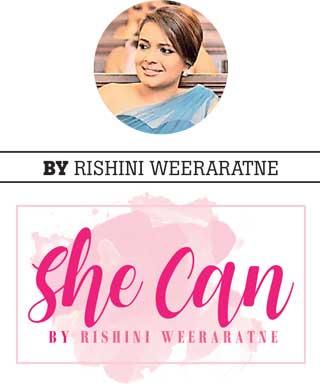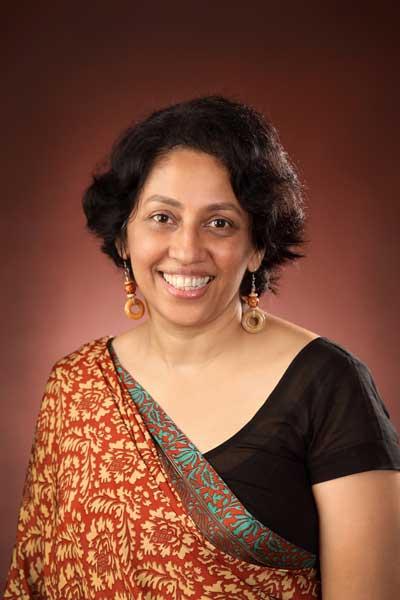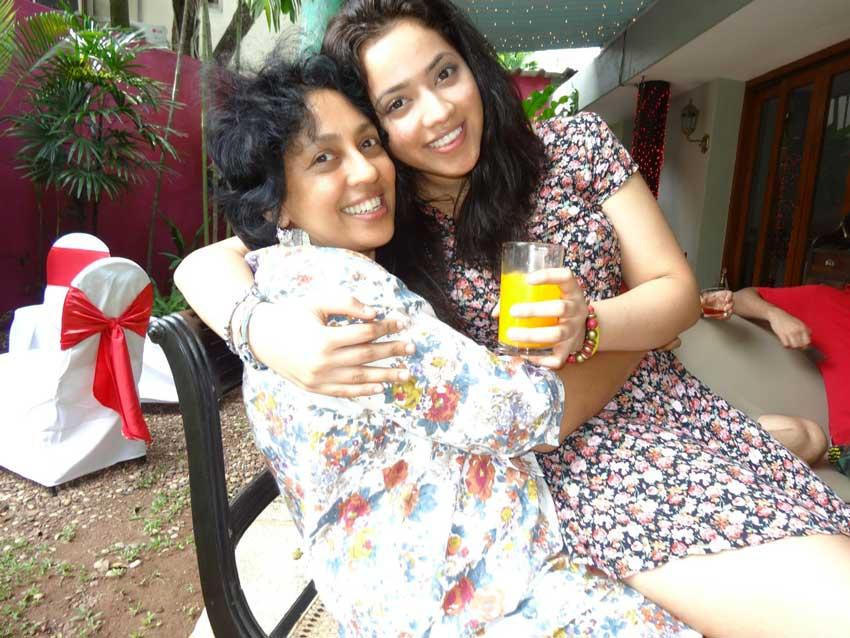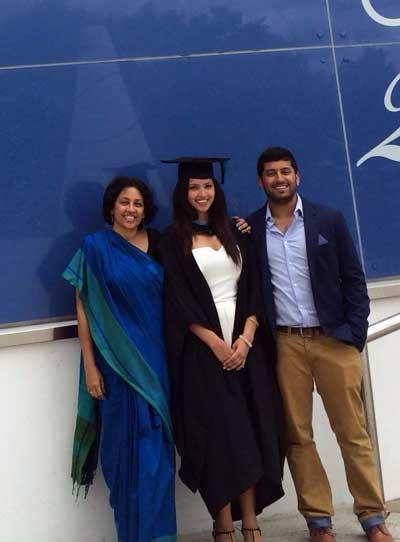01 May 2021 - {{hitsCtrl.values.hits}}
 She was the first female Brand Manager at Reckitt Benckiser Group, Sri Lanka, and the first female Senior Manager at Singer Sri Lanka. She was the first female Marketing Director at New Zealand Milk Products Lanka (Fonterra), and she was the first female Deputy Director-General of the Board of Investments (BOI), Sri Lanka. She was the first female General Manager of Sales and Marketing at Janashakthi Insurance PLC, and the first female to hold this position in the insurance industry in Sri Lanka.
She was the first female Brand Manager at Reckitt Benckiser Group, Sri Lanka, and the first female Senior Manager at Singer Sri Lanka. She was the first female Marketing Director at New Zealand Milk Products Lanka (Fonterra), and she was the first female Deputy Director-General of the Board of Investments (BOI), Sri Lanka. She was the first female General Manager of Sales and Marketing at Janashakthi Insurance PLC, and the first female to hold this position in the insurance industry in Sri Lanka.
She is a Communications and Branding Specialist with over thirty-years of experience in Media, Marketing, Strategic Planning, Advocacy and Competitiveness Consultancy. She has several years of experience working across the region, from Malaysia and Sri Lanka, to several other East Asian markets. She has held Senior Advisory Level positions in private, multinational, government and NGO entities across Asia, and currently sits on the Board of several Trusts and Companies in Sri Lanka. She is a Non-Executive Director of Sarvodaya Development Finance, and a Non-Executive Director and a Board Member of Keells Food Products PLC, and Optima Design. She is a Board Trustee of NTT - The Neelan Thiruchelvam Trust, and is a Member of the Management Board at The Informatics Institute of Technology (IIT), Sri Lanka. She was a Former Board Trustee of Environment Foundation Limited (EFL), The Arthur C. Clarke Centre for Science and Technology and The Eagle NDB Fund Management.
 Apart from the many Board appointments her career has been wide and varied, from building FMCG brands to cutting edge US based tech companies; she was the Vice President of Marketing and Strategy for Asia and Middle East at Emojot Inc. She also successfully completed a ten-year stint in Malaysia as Former Group Director Strategy at Foetus International, and related Omnicom Group companies; Naga DDB, Tribal DDB, Rapp Collins and DDB PR (as General Manager). She was the Former Managing Director, Interbrand, Malaysia, and simultaneously, she also launched her own virtual Foundation, IDEAHA, to help social enterprises, and launched a Consultancy company, ESP Consult in Sri Lanka, where she successfully concluded projects with NORAD, GIZ, USAID and ADB, to name a few. She was instrumental in assisting the transformation of leading corporates such as, NDB (National Development Bank) in the banking sector, Singer in the retail sector and Janashakthi in the insurance sector.
Apart from the many Board appointments her career has been wide and varied, from building FMCG brands to cutting edge US based tech companies; she was the Vice President of Marketing and Strategy for Asia and Middle East at Emojot Inc. She also successfully completed a ten-year stint in Malaysia as Former Group Director Strategy at Foetus International, and related Omnicom Group companies; Naga DDB, Tribal DDB, Rapp Collins and DDB PR (as General Manager). She was the Former Managing Director, Interbrand, Malaysia, and simultaneously, she also launched her own virtual Foundation, IDEAHA, to help social enterprises, and launched a Consultancy company, ESP Consult in Sri Lanka, where she successfully concluded projects with NORAD, GIZ, USAID and ADB, to name a few. She was instrumental in assisting the transformation of leading corporates such as, NDB (National Development Bank) in the banking sector, Singer in the retail sector and Janashakthi in the insurance sector.
An alumna of Kelaniya University, Sri Lanka, she holds a BA in Archaeology and Philosophy. Other professional qualifications in her portfolio include a Diploma in Professional Marketing (CIM), and numerous certifications in Marketing Management from the Management Institute of Ahmadabad, India, and New Product Marketing from NUS (National University of Singapore). She is the recipient of the Women Super Achiever Award 2014, awarded by the World Women Leadership Congress. In 2014, she was ranked as being one of the Fifty Most Powerful Women in Sri Lanka, and in 2013, was the recipient of the Brand Leadership Award at the fourth CMO Asia Awards. She was also the recipient of the Professional and Career Women’s Award in 2012 for Banking and Finance, awarded by Women in Management, Sri Lanka.
She is a true global local, who has made her mark across the Asian region. She is an empowered power woman and she has repeatedly shattered the glass ceiling. She Can and she is a courageous, inspirational, corporate powerhouse; Shehara Parakrama De Silva.
What are the most important attributes of successful leaders today? In reality every successful leader is flawed and vulnerable; they just hold out better with a composite of balancing attributes. Management theory will tell you that authenticity, empathy and integrity are critical characteristics. Decades ago I co-wrote two fascinating studies on two of our largest family-owned businesses in Sri Lanka; HEMAS PLC and Ceylon Biscuits Limited, for a USAID funded competitiveness project. It was used as an MBA text by the Post Graduate Institute of Management, and it looked at leadership traits. I was given access to board minutes and strategy papers from the beginning of incorporation right across to the growth of different business verticals and looked for leadership insights. What a fascinating study it was. I also worked on a Political Communications Campaign strategy in Malaysia, and had a worm’s eye view of some of the key political leaders; both Chinese and Malay. Mahathir was a classic example of a successful leader who was an utter fox; corrupt, intelligent and compromised. But a fighter with a vision. He stoked communalism, and regretted his pro ‘Bumiputhra’ policies in later years, but he developed Malaysia and made it an economic force in the East Asian region. He had political finesse and could read the pulse of the people. But it wasn’t empathy as much as being manipulative.

What many leaders do have are strong strategy and they take calculated risks. They also have self-belief, incredible drive, attention to detail and command respect by fear or by chemistry, and communicate well. Often those that can identify and nurture good people and empower them to deliver are strong in business. Locally in Sri Lanka, going back to a different era, I’d say Lal Jayasundere in his day for building Hayleys as one of our most innovative companies and Lalith Athulathmudali, for what he did with our Ports, building it to competitive advantage, are two of our finest leaders. Another fantastic leader was Neelan Tiruchelvam. A brilliant Harvard Constitutional Lawyer and Peacebuilder who would have been our Nelson Mandela, had he not been senselessly killed by the LTTE.
How did you move forward when everyone kept telling you that your suggestions or ideas won't work? I’m sure at one point during your career your ideas would have been shot down? If I have been shot down, it has never been because I was a woman. My strength is market strategy. But I am also a contrarian thinker, so many conservative peers or bosses have tried to temper my ‘left-of-center thinking’. Once they get to know me and trust me as I deliver on these strange ideas or tactics, I am given a free hand to build on them. If rejected, I argue my view but move on. Good leaders appreciate independent thinkers and not yes men or women. Sri Lankan corporate leaders are quite risk averse. Sumi Moonesinghe was an exception, she was a risk taker. I was her Marketing Director at Anchor when she decided to launch Rathi as a second brand to compete in the tea and coffee segment. This was a daring move, but it worked. Today, Rathi is the market leader.
How did you reach your level of success, given the country’s gender gap, especially among leadership? I was quite privileged, nearly all the posts I held I was the first woman doing it in the organization, but it was a strength more than a handicap. I brought a different perspective. I gave no quarters and asked for none. You know that’s something strong women learn: not to sweat the small stuff. Prejudice or rather lack of confidence in a woman’s capacity to deliver in a male dominant world is a default mechanism. Don’t argue it. Just show them and convert the naysayers.
Do you ever think – “Am I crazy?" Often. I am the round peg in a square hole, an outlier. I can’t stand group think and just going with the status quo for the sake of not rocking the boat. Anyway some of my craziest ideas have also been my most successful ideas.
 How do you differentiate yourself? That’s easy. I am decidedly an oddball. I don’t have to try. The old Shakesperean line holds true, “To thine own self be true.”
How do you differentiate yourself? That’s easy. I am decidedly an oddball. I don’t have to try. The old Shakesperean line holds true, “To thine own self be true.”
What is your 'why?’ Purpose is what lights the fire in my belly. The need to make a difference. To teach my kids the right values and to constantly stand up and be counted. To work with organizations or brands that can build markets, and above all to touch and impact lives positively. As I look back on my career, some projects that make me so proud include, NDB’S Captain Cool World Cup campaign that collected Rs. 175 million to buy the first MRI Scanner for the General Hospital and the setting up of the chain of Singer Culinary Schools and using it as a platform to train migrant workers so they had some skills when they went overseas.
Who do you look up to for inspiration or mentorship? My late parents and my grandparents. My dad died when I was thirteen years old and my mum died when I was nineteen years old, but their talent, values and their world view is largely engrained in me. My father was an intellectual, he was a Civil Servant and a man of absolute integrity. He was also a national chess player and we both share a love for Jazz Music and Poetry. Mum was artsy and immensely talented, she acted and painted, and also wrote and pioneered the first English language Woman’s Magazine in Sri Lanka. She was a rule-breaker, she entered Medical College in an era when few women got in, and subsequently dropped out and went to Fleet Street in London and trained as a Journalist. My late husband was also extremely supportive and never felt threatened by my own career. He was a people driven leader and I learnt the art of leading as a friend than a boss, from him.
What is one decision you wish you didn't make? I always wanted to be a successful Author of creative fiction or go to film school; I have not done either!! My biggest regret is that I couldn’t replicate the international destination marketing in Sri Lanka. I did much more in Malaysia. I trained at IDA Ireland on FDI strategy , on a USAID scholarship, and grew the Sri Lankan BOI to being one of the fastest growing in the world. But it was chaotic, regimes changed, the Chairman’s head rolled, the policy was increasingly incoherent, and I too had to face my own personal challenges as my husband fell sick. Hence, eventually I opted out of trying to stay and chase pipe dreams of helping my country as much as I had helped Malaysia.
How do you keep your team motivated despite conflicts and obstacles? Humor! I think they know I have their backs and I don’t believe in hierarchy, and treat the office cleaner and the Director with the same respect. I believe in work and play. I push teams but I also laugh and forgive. Above all, I am essentially kind and approachable. Some individuals can find me forceful and driven, wanting an extra yard or three, and might not agree with my mantra – “reach for the stars and we might hit the roof at worst,” but they soon discover that I do not focus on failure but insist on trying to do one’s best.
What has been the highlight of your career so far? Quite a few actually. My strategy work in Malaysia with Hasbro rewrote the Playdoh brand book; the world’s second biggest player in toys. Building Kohomba to being a category leader with a relatively unknown at that time local manufacturer, Swadeshi, and eventually ousting a multinational brand from the top spot is certainly a career highlight. Furthermore, the work I did in Malaysia for Tourism, MICE and Medical Tourism is another memorable milestone. I contributed in positioning Kuala Lumpur as an Education city and a preferred offshore campus for international tertiary education in the region.
If you could go back and tell yourself one thing before beginning your career what would it be? I wouldn’t change a thing. Perhaps work less hard in the early years, as life is too short.
What was the biggest rookie mistake you made when just starting out? Loads. But less so as a rookie and more as I matured. Several cultural goofs happened as I relocated to work overseas. I recall driving on the highway in Kuala Lumpur on my first foreign posting and it was the first highway I drove on, and I ended up driving on the cycle lane as I was a total newbie to highways. Another time, I didn’t carry my wallet with me, and I took off in the car with my son and got caught at a toll gate; again a first and I couldn’t talk my away out.
Share with us a secret no-one else knows. I love Science Fiction theories. I like talking string theory on blind dates (just kidding!)
How did you balance being a mother and professional? What have you sacrificed (both personally and professionally) at each stage of your career? Not easy. My kids will regale you with all the occasions I missed out on school concerts and sports meets. I never had time to help them with any homework, and one of the toughest decisions I made was to leave my seventeen-year-old son with a friend in Sri Lanka so he could finish his A’Levels, and relocated with my daughter and husband to Malaysia. I had to defacto single parent them from their teenage years as my husband was unwell, whilst trying to maintain a really high profile, high stress job with Naga DDB Tribal, Malaysia, just so that I could get the kids through college. I went on to Head Strategy for several Omnicom Group companies in Kuala Lumpur and also ran a PR company, and headed Interbrand. My career was on an upward trajectory in their growing up years. I juggled it and whenever I could, and when I had the energy, I tried to activities with them. I cycled with them, took them Horse riding, introduced them to arty, quirky and sometimes brilliant people; took my son on a holiday from college to Magic River to meet the brilliantly eccentric Antares aka Kit Lee in Ulu Selangor. In the early years we traveled extensively as a family before my husband fell sick and afterwards too, I somehow managed to maintain an annual family trip with the kids. I also had three stepchildren who in turn became my dear friends.
How was it being a part of a blended family? It was lovely. My children and my stepchildren get on very well, and there is no difference in their love for each other.
What is the best and worst decision you've ever made? Best decision would be to have kids. The worst? Ah! I have done a few silly things. No major regrets though.
What do you think is the most significant barrier to female leadership? Family. Its not a barrier, its a choice we make, and one we don’t need to fret over. Running in the rat race is not the only thing we women care about. If we need time out for kids and as a result if we seemingly lose out, so be it. It doesn’t matter. Some of us can juggle both, some of us need breaks, some of us have safety nets and some of us don’t, and that’s ok! What matters is that equal pay, equal opportunity and recruitment ratios at every level of management must be tracked, audited and reported against as much as a balance sheet. Board gender representation must be 50 /50. No ifs and buts. Chairs must be given two years to comply or step down. The latest World Economic Forum report states that we will take another one hundred and twenty-five years to achieve parity in the work place. That’s ridiculous. I wrote a long critique some years ago, titled “Wake up boys, lets walk the talk,” in which I suggested a ten-point plan to accelerate greater gender parity for women on Boards and in Senior Management. Let me repeat the three points that still fall on deaf ears:
(1)Champion the Value-Setters and Shame the Laggards. Ensure that any company that is not compliant in Women Board representation is disqualified from any business excellence or sustainability award or ranking.
(2) Name and Shame. The Chambers and the CSE must red-flag companies that are noncompliant.
(3)Develop Champions. MAARC (Men As Agents of Reform and Change) Or AAW (Awesome Aspirational Women).
What woman inspires you? From a global perspective I am enthralled by Jacintha Arden, Prime Minister of New Zealand, and Jacqueline Novogratz, Founder / CEO of Acumen. Locally, Sumi Moonesinghe stands out as a mentor and friend who has always supported me when I was down, and cheered me on when I was flying high. I also have a lot of admiration for Dr. Sulochana Segera, Chairperson, Women in Management. She is authentic and selfless and she has created a huge platform for recognizing and celebrating. Hers too is a tale of resilience and dedication.
What will be the biggest challenge for the generation of women behind you? Survival. I am not being facetious. As a species. As a community. As a keeper of the gate of family values, of the institution of marriage as fundamentally one that is monogamous. Frankly, as AI takes center stage, Gender will not be the limiting factor or the barrier. We will all become more androgynous. The central challenge will be how do we stay more humane. How do we ensure the essential attributes of the eternal ‘she’ - to love, to nurture, and to protect, are not traded in for a playlist of male traits? All scary and Matrix like with the blurring of man and machine rather than man and woman.
How do you want to be remembered one day? A woman for all seasons!! A good mother, a friend who would be present and counted on when the chips are down, and someone who tried to touch a few lives.
What advice would you give to the next generation of female leaders? Just do it!
08 Jan 2025 1 hours ago
08 Jan 2025 2 hours ago
08 Jan 2025 3 hours ago
08 Jan 2025 4 hours ago